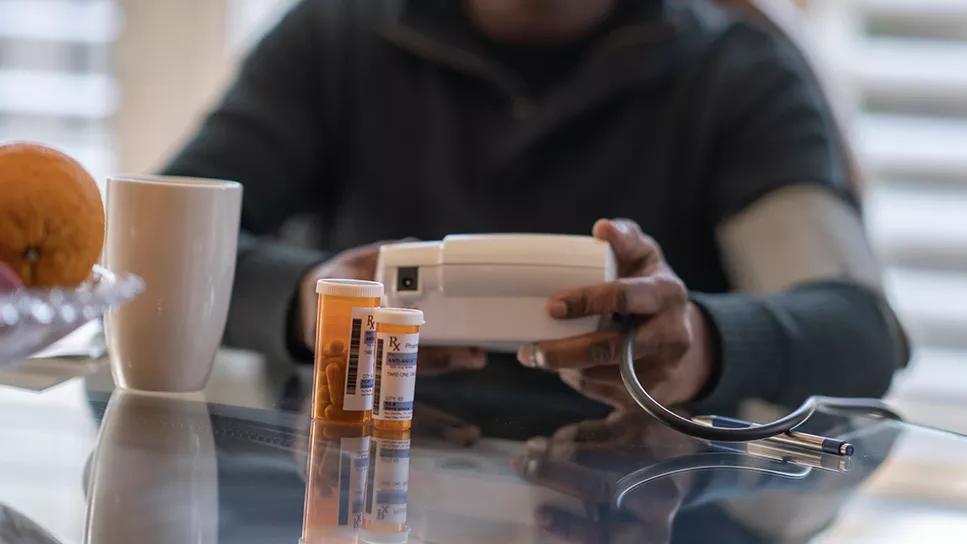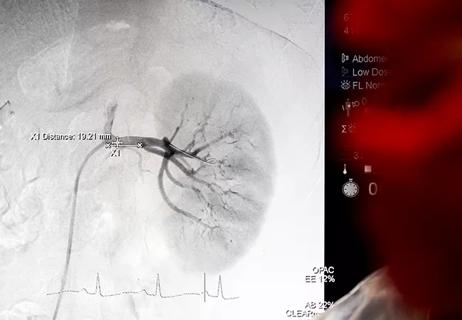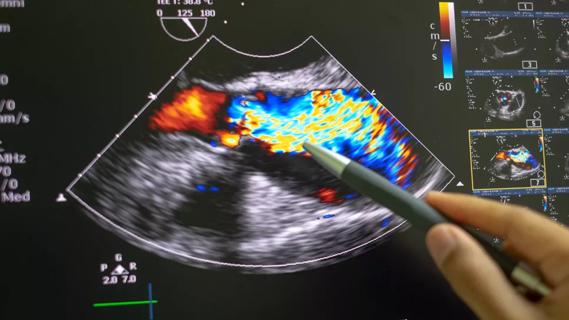Clinicians should individualize dosing practices based on patient risk factors and preferences

By Elias Bassil, MD; George Thomas, MD; Jagmeet Dhingra, MD; and Ali Mehdi, MD, MEd
Advertisement
Cleveland Clinic is a non-profit academic medical center. Advertising on our site helps support our mission. We do not endorse non-Cleveland Clinic products or services. Policy
This article is reprinted from the December 2023 issue of Cleveland Clinic Journal of Medicine 2023 Dec 1;90(12):725-727).
Although the cardiovascular benefits of controlled blood pressure are clear,1 current evidence is insufficient to recommend routinely dosing antihypertensive medications in the evening as opposed to morning for cardiovascular benefit. However, hypotension carries its own risks regardless of the time of day. Clinicians should employ shared decision-making with patients to individualize dosing practices based on risk factors and preferences.
A patient with primary hypertension and coronary artery disease takes antihypertensive medications in the morning. The blood pressure is well controlled throughout the day, but the patient reports that it is elevated in the morning. The physician considers switching the patient to an evening dosing regimen for cardiovascular benefit.
Blood pressure follows a diurnal rhythm, generally lower at night (nocturnal dipping) and increasing in the morning. Because morning blood pressure surges have been associated with cardiovascular events,2 it follows that administration of antihypertensive medications in the evening might confer cardiovascular protection.
Patients with hypertension can be subdivided based on the nocturnal dipping pattern in systolic blood pressure observed on 24-hour ambulatory monitoring:
Advertisement
There is evidence that nondippers are at higher risk for adverse cardiovascular events. Therefore, it makes sense that evening dosing might induce dipping in the nondipper phenotype.
Hermida et al examined this hypothesis in two major studies:
These results seemed to favor bedtime dosing of antihypertensive medications, but the improbable effect size led others to question the methodology (problematic randomization), results (no independent adjudication of cardiovascular events) and conclusions.6 In response, the HARMONY trial (Hellenic-Anglo Research Into Morning or Night Antihypertensive Drug Delivery) in 2018 randomized patients to morning or evening antihypertensive dosing and utilized a crossover design over 12 weeks. Clinic and 24-hour ambulatory blood pressures were compared, and no difference was detected between groups.7
Advertisement
In 2022, Mackenzie et al published the results of the TIME study (Treatment in Morning vs Evening), which included more than 21,000 patients randomized to once-daily dosing of medications, daytime vs evening. Patients were followed for a median of 5.2 years. The primary outcome examined was a composite score including hospitalization for nonfatal myocardial infarction or stroke and vascular death. The primary end point was seen in 3.4% of patients in the evening dosing group and in 3.7% of patients in the morning dosing group (HR 0.95; 95% CI 0.83–1.10; P = .53). The authors concluded that patients should take their antihypertensive medications when convenient and when they experience the fewest side effects.8
A 67-year-old woman with a history of glaucoma, hypertension and Type 2 diabetes mellitus presents to establish care. Her blood pressure is uncontrolled, and she reports that she forgets to take her medications in the morning because of her fluctuating schedule. She had been told to avoid taking blood pressure medications in the evening, when she routinely takes the rest of her medications, to minimize the risk of falls and worsening glaucoma.
Fall risk is a major concern with dosing of nocturnal antihypertensive medications. After older studies linked low blood pressure (systolic blood pressure < 120 mm Hg) to an increased risk of falls,9 many clinicians avoided prescribing evening antihypertensive medications to prevent orthostatic symptoms in the morning and to minimize fall risk. More recent data that examined intensive blood pressure control (systolic blood pressure < 120 mm Hg) showed a possible increased risk of syncope but not of falls.10 The TIME study examined dizziness, falls and fractures as secondary end points. Patients in the evening-dosing group reported fewer falls than their morning-dosing counterparts. The number of fractures reported was similar in both groups. The morning-dosing group reported more events of dizziness or lightheadedness.8
Advertisement
Another concern with nocturnal dosing of antihypertensive drugs is glaucoma, a debilitating disease worldwide. Nocturnal decreases in systemic blood pressure have been postulated to lead to decreased ocular perfusion pressure, which may lessen blood flow to the optic nerve and perpetuate glaucomatous damage.11 Studies have yielded equivocal results, but evidence is mounting that both high and low blood pressure are associated with an increased risk of glaucoma. A meta-analysis found that a fall in nocturnal blood pressure is a risk factor for worsening glaucomatous damage and visual field loss,12 suggesting that evening dosing of antihypertensive medications may be inadvisable in patients with glaucoma who have a pronounced nocturnal blood pressure dip. However, the available data are not robust enough to yield practice guidelines. Shared decision-making is key, given the potential risk of glaucoma progression with lower nocturnal blood pressure.
Regarding the 67-year-old patient in scenario 2, her comorbidities including glaucoma suggest a need for shared decision-making to weigh the potential risks of worsening her glaucoma with nocturnal dosing of blood pressure medications against the risk of compromising adherence if morning dosing is recommended.
Current evidence does not suggest any benefit with evening vs morning antihypertensive medication dosing. The cardiovascular outcomes and overall side effects appear to be similar. Patients who take their medications in the evening do not appear to have an increased risk of falls or fractures, but they also do not appear to have better cardiovascular outcomes. The focus should be to achieve blood pressure control and facilitate adherence, regardless of the timing of antihypertensive medications.
Advertisement
It is unclear whether nondippers and reverse dippers, or even patients with early morning blood pressure surges, would have better cardiovascular outcomes with a regimen that includes nocturnal medication dosing. Data are lacking in these subgroups of patients, and identifying them remains a challenge given the limited use of ambulatory blood pressure monitoring.
For most patients with hypertension, the act of taking the medication as directed has more significance than the timing.
Drs. Dhingra, Mehdi and Thomas are staff in the Department of Kidney Medicine at Cleveland Clinic. Dr. Bassil is a nephrology fellow.
For a list of references and disclosures, see the original article in Cleveland Clinic Journal of Medicine (2023 Dec 1;90(12):725-727).
Advertisement

Fixed-dose single-pill combinations and future therapies

General principles for use of the long-awaited new therapy approach

Results inform dose selection for further trials of the aldosterone synthase inhibitor

Phase 2b trial of aldosterone synthase inhibitor also finds no benefit from dose escalation

Insights for diagnosing, assessing and treating

Getting patients to their goal blood pressure

Pediatric urologists lead quality improvement initiative, author systemwide guideline

Reproductive urologists publish a contemporary review to guide practice